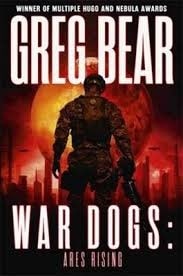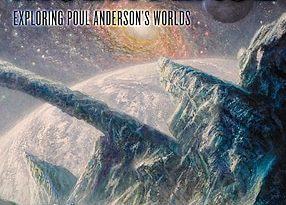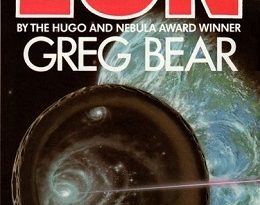War Dogs (book 1) by Greg Bear (book review).
Just as there is a vogue for action films, especially those with lots of explosions and combat based video games, there is a huge slice of the SF market taken up by the readers of future war novels. This novel, the first in a trilogy (although it doesn’t mention that anywhere on or in the volume) will appeal initially to those who tend to home in on this kind of literature. Ever since the wooden horse was left outside the gates of Troy as gift, there has been a tradition in story telling of the double-edged present. Science Fiction has never been immune. From Murray Leinster’s ‘The Greks Bring Gifts’ through Arthur C. Clarke’s ‘Childhood’s End’ to the current generation of writers, the theme of aliens arriving with a gift, often of technology or the promise of world peace, only for the recipients to find the hidden agenda when it is far too late. Greg Bear has added himself to this illustrious company.
The Gurus arrived in secret, setting up a base in the mountains of the Yemen. Once established, they sent out ambassadors offering advanced technology without actually revealing themselves. Only once human civilisation had accepted the gifts did they demand payment. The Gurus were not the only space-faring race out there. They were being pursued by an extremely violent enemy intent on their destruction. The enemy, known only as Antags, have set up a base on Mars. The Gurus tell the humans that if the Antags are not defeated, they will destroy humanity. How much of this is true, there is no way of knowing, but Earth’s forces find themselves embroiled in a war not of their choosing on a hostile planet.
In the past, there have been attempts to colonise Mars, not very successfully, with the result that there are small pockets of humans eking out an existence there. The first person narrator, Master Sergeant Michael Venn, is a veteran of the war against the Antags. He and his fellow Skyrines (Space marines) are dripped onto the red planet using Guru technology. They know it is dangerous. What they don’t expect is drop vehicles to be targeted and that this time very few will make it safely to the surface and without most of their equipment. There are a handful of survivors. Each are equipped with Skintights – a cover-all, airtight suit reminiscent of those created by Frank Herbert for his inhabitants of Dune, but these have to recycle everything and there a limit to the amount of air available. A rupture is an equivalent of death in the thin atmosphere. Normally, troops are within range of a Fountain, another Guru device from which they can replenish air and water. There are no working ones within range. They manage to find an intact tent from a Russian drop to spend the night but, after that, the outlook looks bleak.
In the nick of time, they are picked up by Teal, a woman fleeing from the Voors, as the residual colonists style themselves. While grateful for transport and essentials, Venn is aware that Teal is unlikely to be altruistic as the colonists were abandoned by Earth. She takes them to a structure she calls the Eastern Drifter. This appears to be an abandoned mining complex where survival is possible. But Teal is being pursued by a group of Voors, the Antags are ready to kill everyone and, to add to the complications, an all female fighting unit turns up with an agenda of its own.
The dramatic tension is high throughout and the only player that is unlikely to be sacrificed to the roll of the dice is Venn since he is recounting the events. The degree of sophistication regarding the conditions on Mars is extremely high. With the exception of the Guru technology, everything is well within known scientific bounds, so the question is, why didn’t I enjoy it? It probably comes down to the prose style. The whole of the novel is written in the present tense. While this can be extremely effective, here it is an irritation. Some of the novel is narrated after Venn has returned to Earth (so you know from the start that there are some survivors) and some is an account of the events that happened on Mars. If the tense was used to differentiate past from present, the choice would make more sense. I am not averse to military SF and, as the author is American, the use of US jargon can be expected though sometimes inexplicable. Fans of space warfare and Greg Bear will no doubt enjoy this. I don’t anticipate reading volume two.
Pauline Morgan
March 2015
(pub: Gollancz. 291 page enlarged paperback. Price: £16.99 (UK). ISBN: 978-0-575-10099-2)
check out website: www.orionbooks.co.uk






